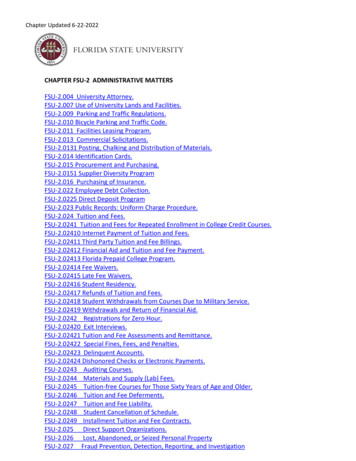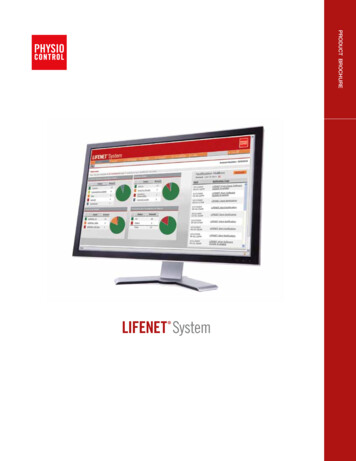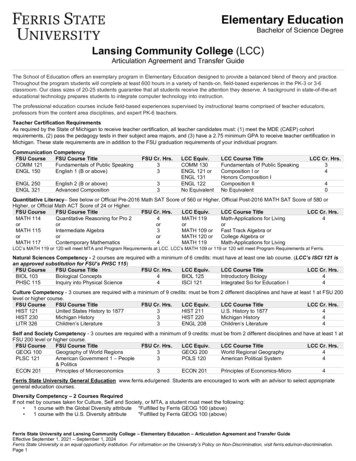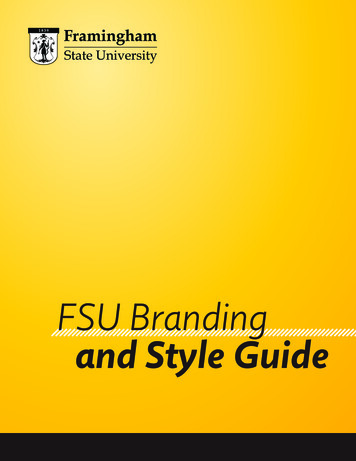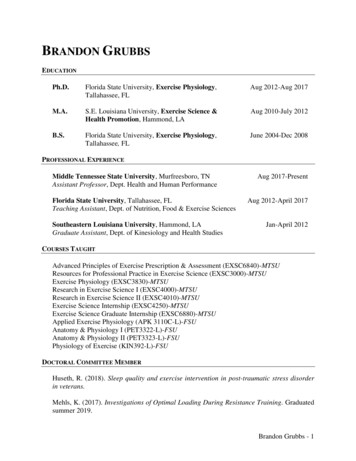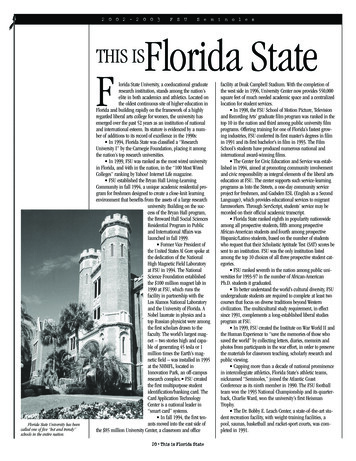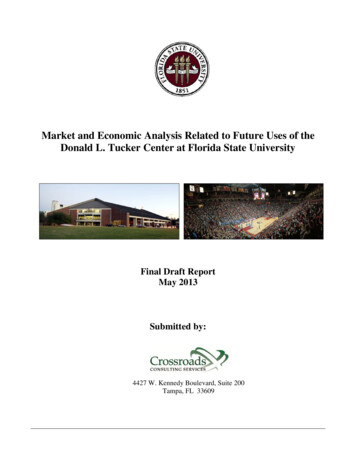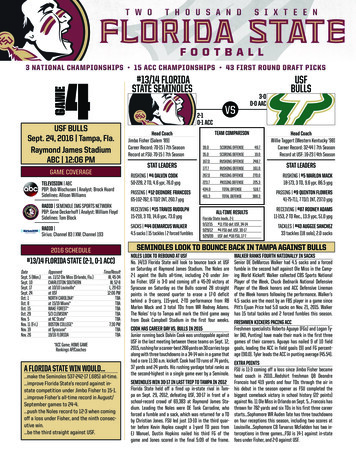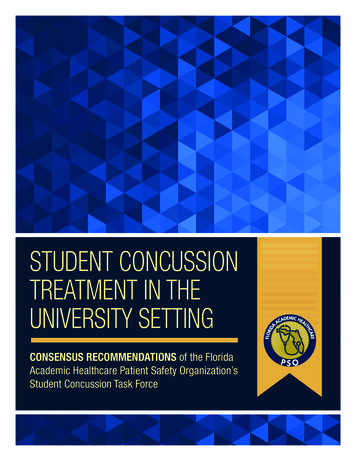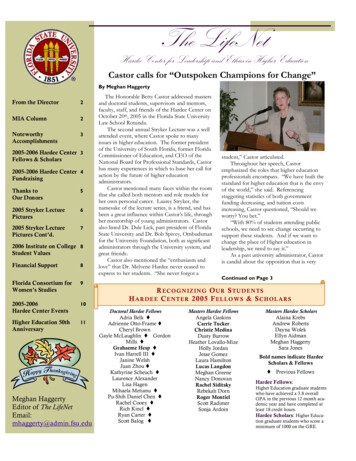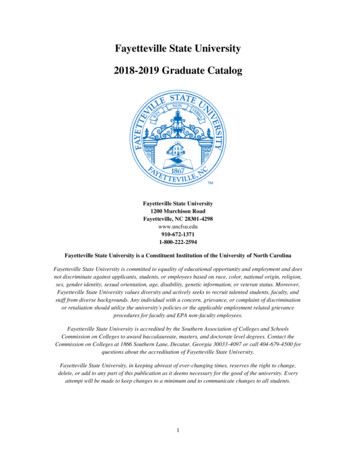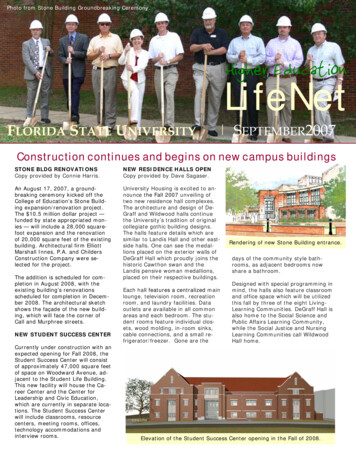
Transcription
Photo from Stone Building Groundbreaking Ceremony.Higher EducationLifeNetFLORIDA STATE UNIVERSITYSEPTEMBER2007Construction continues and begins on new campus buildingsSTONE BLDG RENOVATIONSCopy provided by Connie Harris.NEW RESIDENCE HALLS OPENCopy provided by Dave Sagaser.An August 17, 2007, a groundbreaking ceremony kicked off theCollege of Education’s Stone Building expansion/renovation project.The 10.5 million dollar project —funded by state appropriated monies — will include a 28,000 squarefoot expansion and the renovationof 20,000 square feet of the existingbuilding. Architectural firm ElliottMarshall Innes, P.A. and ChildersConstruction Company were selected for the project.University Housing is excited to announce the Fall 2007 unveiling oftwo new residence hall complexes.The architecture and design of DeGraff and Wildwood halls continuethe University’s tradition of originalcollegiate gothic building designs.The halls feature details which aresimilar to Landis Hall and other eastside halls. One can see the medallions placed on the exterior walls ofDeGraff Hall which proudly joins thehistoric Cawthon swan and theLandis pensive woman medallions,placed on their respective buildings.The addition is scheduled for completion in August 2008, with theexisting building’s renovationsscheduled for completion in December 2008. The architectural sketchshows the façade of the new building, which will face the corner ofCall and Murphree streets.NEW STUDENT SUCCESS CENTERCurrently under construction with anexpected opening for Fall 2008, theStudent Success Center will consistof approximately 47,000 square feetof space on Woodward Avenue, adjacent to the Student Life Building.This new facility will house the Career Center and the Center forLeadership and Civic Education,which are currently in separate locations. The Student Success Centerwill include classrooms, resourcecenters, meeting rooms, offices,technology accommodations andinterview rooms.Each hall features a centralized mainlounge, television room, recreationroom, and laundry facilities. Dataoutlets are available in all commonareas and each bedroom. The student rooms feature individual closets, wood molding, in-room sinks,cable connections, and a small refrigerator/freezer. Gone are theRendering of new Stone Building entrance.days of the community style bathrooms, as adjacent bedrooms nowshare a bathroom.Designed with special programming inmind, the halls also feature classroomand office space which will be utilizedthis fall by three of the eight LivingLearning Communities. DeGraff Hall isalso home to the Social Science andPublic Affairs Learning Community,while the Social Justice and NursingLearning Communities call WildwoodHall home.Elevation of the Student Success Center opening in the Fall of 2008.
Words from the DirectorHARDEE CENTERfor Leadership & Ethicsin Higher EducationWe hope that you will plan to joinus for the 4th annual Stryker Lecture and reception prior to Homecoming on Thursday, October 25th,at 5:30pm in the new MedicalSchool Atrium. Dr. Betty Siegel,President-Emeritus of KennesawState University and FSU alumnawill be our featured Stryker Lecturerthis year. She will also present aDoctoral Student Seminar prior tothe lecture.113 Stone BuildingP.O. Box 3064452Tallahassee, FL 32306-4452Phone: (850) 644-5867Fax: (850) 644-1258email: HardeeC@coe.fsu.eduwww.fsu.edu/ elps/hardeeMany higher educationprofessionals throughoutthe country rememberDr. Hardee for her establishment of the FSUHigher Education"LifeNet," a support system that continuesthroughout graduates'professional years. It iswith this guidance thatthe Hardee Center quarterly Newsletterpromotes the "LifeNet" of students, alumni,faculty, and friends of the Florida StateUniversity Higher Education Program, aswell as seek support for future endeavors.INSIDE THIS ISSUE:New construction and renovations1From the Director2From our Perspectives3Alumna Profile: Dr. Susan Komives4Student Spotlight: Nate Crayton7Program Spotlight: ServiceLeadership Seminar (SLS)8Noteworthy Accomplishments9Introducing our new students12Reflections from new ’noles!16Fall Professional Development Events20About the 2007 Stryker Lecture21In the newest issue of the JJC21Aurélio Manuel Valente, Editoremail: avalente@fsu.eduChris Rindosh, Assistant Editoremail: cwr07c@fsu.eduEditorial TeamCharity AgomuoCathy BadgerAnnie CarlsonJackie DeptulaChrystal GeorgeMandy HambletonJill PeerenboomPhoto CreditsBre SkwiraAlex Yanovski2Higher Education LifeNetThe Higher Education program welcomed its 2007 class of 32 newMaster’s students and 9 new Doctoral students this fall. New studentscame from 15 states ranging fromCalifornia to Michigan, and New Yorkto Florida, reflecting the nationalvisibility and popularity of FSU'sHigher Education program. In thisissue of the LifeNet we introduceseveral of these new students andalso feature some of our outstanding graduates.Expanding and celebrating theLifeNet of Higher Education studentsand graduates is one of the mostimportant objectives of the HardeeCenter. We hope you enjoy this edition of the LifeNet and that you willkeep us informed about your activities and interests.As always, we appreciate your continuing financial support and yourmany activities on behalf of our students and graduates. We also hopeyou will take advantage of our newlistservs as a way to keep in touchwith us, and each other. Information about the new listservs andhow to subscribe to them can befound below.Regards,Hardee Center for Leadershipand Ethics in Higher EducationKeep in touch by joining our Listservs!To better serve our alumni and friends, we have recently migrated the LifeNetlistserv, a valuable tool for communication to and between Hardee Center friendsand alumni, from YahooGroups! platform to one supported by Florida State.These new listserv are more accessible to users who do not have a yahoo.com emailaddress. More importantly, this transition will help us protect you against spam. Ithas become increasingly more difficult to safeguard YahooGroups! accounts fromspam emails. Our two new accounts include:LifeNet@lists.fsu.edu, a moderated list with ALL of our alumni, friends and supporters, as a result, this list will be used with great sensitivity. To subscribe or access your account, visit: NetJobs@lists.fsu.edu, an unmoderated list intended for friends who wantto send and receive job postings. To subscribe or access your account, etjobsA note of special thanks to Dorothea Bogert (Ph.D., 2004) who originallyset up the listserv and maintained it - THANK YOU!
From our Perspective: Viewpoints from Chief Student Affairs OfficersA new feature of the LifeNet entitled “From our Perspective” will pose the same questions to three local Vice Presidents forStudent Affairs at Florida A&M University, Florida State University and Tallahassee Community College and will feature theirbrief replies to each question. It is our hope that the varying responses, based on their background and campus characteristics will help inform our readership how diverse institutional contexts impact campus responses to contemporary issues instudent affairs. We encourage you to submit questions for future issues of the LifeNet to hardeec@coe.fsu.edu.To help inform our readership, we’ve asked each Vice President to provide a short profile of their background and experience in higher education.Vice President Mary Coburn, anFSU alumnus(Ed.D., 1992),previouslyserved as vicepresident forStudent Affairsof TallahasseeCommunityCollege from1995 until2002. Mary B.Coburn was appointed FSU's VicePresident for Student Affairs on January 31, 2003. She leads approximately 400 Division of Student Affairsemployees who serve over 40,000students.Vice President Roland Gaines,an FAMU alumnus previouslyemployed atFAMU from1968-2001 asRegistrar, Associate VP for Student Affairs;employed atNorth CarolinaCentral University: 2001-7 asVice Chancellor for Student Affairs; returned to FAMU: July, 2007 as VicePresident for Student Affairs. He leadsapproximately 250 Division of StudentAffairs employees serving 11,500 students.Vice President Sharon Jefferson hasserved as VicePresident forStudent Affairssince 2003. Shehas a distinguished careerwith TallahasseeCommunityCollege, startingher tenure withthe College in1982, serving inpositions including instructor, counselor, and Director of Enrollment Services. Sharon Jefferson leads close to100 Student Affairs staff members whoserve over 13,000 students.Q: Identify the program(s) and/or initiative(s) at your institution that best supports the transition andsuccess of new students on your campus?FSU: For fall semester 2007 the FSUDivision of Student Affairs staff created several new programs that willpositively impact student life at theUniversity. For the first time, weadopted a common reading book,A Hope in the Unseen, that was givento all freshmen at Orientation. A campus-wide committee also implementedthe first University-sponsored tailgateparty for undergraduates. The purpose was to demonstrate healthyways to celebrate Seminole athletics.But perhaps the most far-reachingnew initiative was the establishmentof a Social Justice Living and LearningCommunity in Wildwood Hall. Fortyfreshmen participated in a three-dayretreat and are taking two coursestogether in the hall. This programpromises to have long-lasting effectson our climate as these students goon to serve as leaders for justice onour campus and beyond.3Higher Education LifeNetFAMU: Because I arrived in July,2007, all of the planning for 2007 hadbeen completed. I was very impressed with move-in activities forour Freshmen and welcome week activities. Our new students got off to afantastic start. This year will be oneof transition for the Division of Student Affairs. We will be discussingGood To Great by Jim Collins andways to improve our customer serviceskills.We will also look at our orientationand summer enrichment programming. We are making plans to retakeour place as a leader in the enrollment of National Achievement Scholars. We will also look at ways to improve our retention and graduationrates and spend some time evaluatingstudent affairs effectiveness.TCC: This year, TCC began a restructure of its New Student OrientationProgram. Developing goals based onnational standards and establishinglearning outcomes for the program,our campus-wide committee hasworked to determine how we canengage our students from the momentthey set foot on our campus. Critical tothat initiative will be the support of ourcampus community as we work toinvolve the entire campus in our newstudent activities. Assessment will alsobe a key component to our current andfuture orientation activities.New innovations in student successinclude required academic plans forincoming students, required advisingfor our FTIC and at-risk students, anda College Success class requirement forall students enrolled in two or morepreparatory classes.
Alumni Spotlight: Dr. Susan R. Komives (B.S., ‘68; M.S., ‘69)ing skills at an early age, she headedto FSU in 1964, despite having livedin Vero Beach, she was a bit nervousabout how cold Tallahassee wouldbe. As a self described “continuer,”her undergraduate career consisted ofa full compliment of activities including serving as a freshmen class Senator representing the residence halls,appointment as a Resident Assistant(then called a Junior Counselor),member of Delta Delta Delta Sorority,member of the Motor Board and ofthe President’s Advisory Board. Personally, her college experience washeavily influenced by women’s issuesat a time when FSU had differingpractices for men and women, including a dress policy and curfew forwomen, but not one for men.By Aurélio Manuel ValenteAs a result of her distinguished careeras both a scholar and a practitioner,Dr. Susan Komives stands out amongthe many notable alumni of FloridaState’s Higher Education program. Inaddition to her twenty-year tenure asa faculty member at the University ofMaryland’s College Student Personnelprogram, Dr. Komives’s scholarly contributions include six books in whichshe was the co-author and co-editor,25 book chapters, and numerousrefereed articles, monographs andbook reviews. Her service to the profession includes scores of regionaland national presentations, consultations, and membership in several editorial boards. Her leadership in professional organizations includes serving as president of ACPA, co-founderof the National Clearinghouse onLeadership Programs, and a recentelection as president of the Councilfor the Advancement of Standards(CAS), a term that will continue until2012.When she was looking at colleges toattend, Dr. Komives was told by herfather that she “could go anywhere inFlorida, as long as it was either UF orFSU.” Exhibiting great decision mak-Spurred by initiatives promotingwomen in science, Dr. Komivesearned a Bachelor of Science in Mathand Chemistry. However career options for women in science at the timewere limited to education or actuarialscience. As she examined graduateeducation options, Dr. Komives reflected on a “group dynamics andleadership” course she took as a senior in the College of Education that“truly expanded [her] mind.” As aresult, she met with her instructor foradvice about graduate degree optionsand had an “a-ha” moment when sherealized she could actually work incollege student personnel. Whenprobed if she enjoyed teaching or theprocess of education, she was referred to FSU’s graduate program. Inseeking more information, she metwith a woman for an informationalinterview. Later she realized her interviewer was Dr. Hardee and theinformational meeting was actuallyher graduate admissions interview.After graduating with her undergraduate degree in 1968, Dr. Komives enrolled in what was an intensive oneyear program at FSU that she described as “exceptionally rigorous.” Dr. Komives recalls Dr. Hardeeas someone who was “cutting edgeand future-oriented” and who wouldoften have her students read drafts ofimportant national reports before theywere widely available. In addition toDr. Hardee’s guidance, Dr. Komivesbenefited from the mentorship of doctoral students such as Annette Gibbs,Fred Badders, and Emma Schulken, allof whom went on to have accomplished careers in higher education. Dr. Komives places her graduateexperience at FSU in the context of anevolving profession, as she noted,“this was a year before Arthur Chickering would publish his seven vectorsof student development” in the firstedition of Education and Identity.Dr. Komives remembers Dr. Hardeeencouraging her students “not to beshy” and take a stand when they believed strongly in something. Dr. Komives recounted experiences whenDr. Hardee boycotted the APGA conference because it was held in LasVegas and felt that the location woulddetract from the educational and professional experience. In another example of Dr. Hardee’s conviction, sherecounted the time that Dr. Hardeevoiced her dissatisfaction that the association’s President’s Address wasclosed to those who attended a luncheon and felt the address should beopen to any of the organization’smembers. Dr. Komives recalled themany “wonderful classroom experiences” that she now understandswere “well constructed learning exercises,” practices she emulates in herclassroom to this day. Dr. Komivesalso traces her value for how important it is that student affairs departments collaborate with graduate programs to her own experience at FSU.Shortly after graduating with her Masters degree from FSU, Dr. Komiveswas married and served as an areacoordinator at the University of Tennessee in Knoxville. In an effort tosupport a colleague, she joined him inregistering for a doctoral level coursein January of 1970. While he nevercompleted his degree, she earned herDoctorate of Education in three years,all while working full-time and beingpromoted three times. Ultimately sheserved as Acting Director of ResidenceLife before accepting a position asSee ALUMNI page 5.Higher Education LifeNet4
Alumni Spotlight: Dr. Komives (continued)2006 she became the only personconcurrently to receive the Contribution to Knowledge Awards by bothACPA and NASPA.Komives Family in Boulder, ColoradoAssociate Dean of Students at Denison University. At Denison, she became the first person to serve in therole of Dean by function and not gender; previously individuals served aseither Dean of Men or Women. Dr.Komives was also the first individualto supervise functional areas that included Student Activities, Housingand Greek Life. Dr. Komives proudlystates that she was the “direct beneficiary” of the women’s movement inthe development of her career. Atthe age of 32, she became Vice President and Dean of Student Life atStephens College in Columbia, Missouri, an all women’s institution,where coincidentally Dr. Hardee hadpreviously served as chair of facultyadvising.It was during her tenure at StephensCollege that Dr. Komives also servedas President of the America CollegePersonnel Association from 1982-83,while she was pregnant with her firstchild. During this busy time, Dr. Komives jokes that her “plants died andhouse was never clean,” but recallsher achievements in helping establishthe Senior Scholars program, supporting the development of a theoryand research board and working withACPA’s then parent organizationAmerican Personnel and GuidanceAssociation (APGA).After leaving Stephens College in1985, Dr. Komives also served asVice President for Student Development at the University of Tampa. Herprofessional experiences at small5Higher Education LifeNetprivate institutions provided her withan appreciation for a student’s development and growth during the collegeyears. At a small college, it was easier to work with students holisticallycompared to her experiences at largerinstitutions. Dr. Komives stated, “youcould meet with a freshmen for a disciplinary hearing, and have that samestudent be a leader in student government their senior year.” Dr. Komives continues, “for a young professional, it was easier to build your ownreputation and credibility that allowedyou to get things done.”In examining her next step, Dr. Komives explored faculty positions, having “always been drawn to ideas andlearning.” She began working at theUniversity of Maryland in 1987, whereshe continues to teach today. Duringher time at Maryland she has servedas acting Department Chair and theprogram director for the College Student Personnel Program and supervised the work of 27 Master’s thesescommittees, 32 Master’s papers andchaired 24 Doctoral dissertation committees. In recognition of her work,Dr. Komives was recently recognizedwith The Excellence in TeachingAward (2006) by the university; Outstanding Mentor to Graduate StudentAward (2006) by the Committee onGraduate Students and New Professionals, ACPA-College Student Educators International; and The Robert H.Shaffer Award for Academic Excellence as a Graduate Faculty Member(2004) by the National Association ofStudent Personnel Administrators. InIn her current role as President-Electof the Council for the Advancement ofStandards (CAS), Dr. Komives is eager to promote the work of the 37CAS member organizations to advanceinstitutional effectiveness, studentlearning, outcomes assessment, accountability, and quality assurance. Upcoming plans include a focuson the “application” of using the standards as benchmarks for developingand refining learning outcomes. Whilethere have been conversations aboutthe accreditation of student affairs asa profession, Dr. Komives believesthat should not be the purview ofCAS. Dr. Komives suggests that“much like Counseling Centers andCollege Health Centers, if accreditation is advanced, it should be advanced by individual professional associations.”To ensure a long and rewarding careerin higher education, Dr. Komives hasthree recommendations for her students, and readers of theLifeNet. First and foremost, she encourages everyone to be dualcentered and balance professionalambitions with care for family andpartners. Secondly, she encourageseveryone to recognize the differencebetween career and professional development. While it is important todevelop your career by building newskills and enhancing your areas of expertise, it is just as important to provide leadership in our profession byadvancing principles of social justice,access and opportunity. Lastly, Dr.Komives encourages everyone to advance our field at both the local andnational level through leadership inprofessional organizations and advancing policies and programs thatpromote higher education.Dr. Komives is married to artist, RalphKomives. She is the mother to AirForce Lt. Jeffrey Komives and stepmother to Rachel Hanson and proudgrandmother of Mary (8) and Molly(6).
Ripple effect of good mentorshipEditor's Note: As many of the friends and alumni know,Dr. Hardee was often referred to as "The Mentor" and herphilosophy around mentorship helped create the culture ofsupport dubbed "The LifeNet" that permeates the HigherEducation Program. As you can see from the alumni profile ofDr. Komives, Dr. Hardee's values and philosophy continuestoday in the practice of her more than 400 students; and inspirit, through the work of the Hardee Center.Susan Komives, Susan Longerbeam, Felicia Mainella,Laura Osteen, and Julie Owen (L to R).By Dr. Laura OsteenTwenty years ago, Susan Komivesmoved to Maryland; Indiana University won the NCAA Men's BasketballNational Championship; and thedaughter of Susan's new colleague,Jim Osteen, was applying to college.I, Laura Osteen, unswayed by anyuniversity family discount, was off toballet and basketball in Bloomington,Indiana. Two bad knees, four changedmajors, one undergraduate degree,one graduate degree, five years in thefield, and one significantly changedfamily discount policy later - I wassingularly focused on returning toMaryland to study with the womanwho had moved there at the verytime I left.I returned to Maryland to study withSusan Komives, the woman whoselove has shaped me personally andprofessionally, and whose path andguidance I have been honored to follow. From University of Tennesseeroots, Stephens College professionalexperience, University of Marylandclassrooms, to my current position ather beloved alma mater Florida StateUniversity, I have treaded lightly inthe large footprints Susan has madein our field. Through my journey, Iam grounded in the knowledge that Icontinue to learn from a womanwhose strength of love and compas-However, truly gifted mentors not only help produce talentedand caring professionals and scholars, they also produce morementors that influence the culture of student affairs and helpnurture future professionals. Such is the case with Dr Hardeefor Dr. Komives, who in turn has mentored many master's anddoctoral students, including FSU's own, Dr. Laura Osteen whoserves as the co-director of the Center for Leadership andCivic Education. Dr. Osteen was kind enough to contribute tothis issue of the LifeNet newsletter by providing a personalaccount of her time with Dr. Komives.sion is only matched by her undaunting search for excellence and knowledge.Susan’s vita reads like a graduatecourse syllabus. Her research andpublications are standard requirements in graduate courses across thenation. From the seminal StudentServices and CAS Standards, toLearning Reconsidered and ExploringLeadership, and most recently theLeadership Identity DevelopmentModel and Multi-Institutional Study ofLeadership, Susan and her colleagueshave created the new paradigm ofstudent learning and leadership thatdrives the future of our work.Not only has she defined our guidingconstructs, she has redefined andexpanded the boundaries of ourknowledge and conceptualization ofstudent learning and leadership development.As a teacher, Susan expands and amplifies her written work through creating a learning environment that reinforces proven theories and createsnew knowledge in practice. As a student in her classroom, I was challenged to think, expected to analyze,and supported for my growth. Susandoesn't just write about leadership,she chooses a life of leadership. Shecombines her scholarly knowledgeand practical experience to be a wiseleader and mentor in the field.Through her professional leadershipexperiences Susan has grasped theopportunity to bring professional accountability, theoretical integration,and diverse perspectives into theways and means of our work. As anadvisor she brings this integratedknowledge to bear on your work in theclassroom, in your assistantship, andin life. She is physically and mentallywith you on your personal and professional journey.Susan's unique contribution to studentpersonnel work is her generative leadership. Susan is developing the nextgeneration of student affairs educators through living the life of Kolb's(1984) learning cycle. She takes allof us through her reflective observation of her concrete experience as apractitioner in the field that guides herabstract conceptualization and activeexperimentation as a researcher andadvisor. As a teacher, researcher,and leader, Susan is a meaning makerin the field of student affairs. Herwork influences and creates the socialconstruction of who we are as a profession. As a dissertation advisorSusan expected an understanding andhonoring of the power and impact wehave to create knowledge. Sheworked seamlessly with me throughthe creation process of learningSee MENTOR page 9.Higher Education LifeNet6
Student Spotlight:Nate Craytonfootball in the street with his olderbrother and friends. As a car approached, everyone else cleared thestreet; however, Nate did not hearthe car, nor was the driver payingattention. Nate turned around just intime to lay flat on the ground so thatthe car could drive over him. Miraculously, he was unharmed by the incident although it is a moment he willnever forget. Still, obstacles such asthese have never made Nate feelsorry for himself, or wish that his disability would disappear, as he believes these are the things that havehelped shape him into the person heis today.By Chrystal GeorgeIf there was a superlative in the FSUHigher Education program for “MostPositive Attitude,” Shanathan “Nate”Crayton would be a shoe-in for theaward. Always smiling bright andstaying cheerful, he is known by hispeers as a good-natured person whois always willing to offer a helpinghand or positive encouragement. Agraduate of Florida A& M University,Nate came to FSU after years workingwith college students as a collegiateminister and as a singles’ ministrycoordinator in Tallahassee. As aleader and mentor, he saw the impactthat the college experience had onstudents’ lives. Realizing that he couldlearn more about student needs andtheir development by going back toschool, Nate decided that starting agraduate program in student affairswould be his next focus. After hearingabout FSU’s Higher Education Program from a friend, he decided toapply. Now more than a year later,Nate is beginning his second year inthe master’s program and continuingto help college students learn andgrow.Yet, life for Nate has not been withoutits own set of challenges and hardships. Born hearing impaired in bothears, he has built strength throughthe obstacles that he’s faced andovercome. At the age of four, Natewas nearly killed while out playing7Higher Education LifeNetAlthough his circumstances havehelped him to grow as an individual,Nate is also thankful for the encouragement he receives from others. Infact, it is the community and careamong students, faculty and staff thatis one of his favorite things about theHigher Education program at FSU.The support he receives from his supervisor and mentor, Bea Awonyi,Director of the Student Disability Resource Center, has been particularlyimportant to him. He cites Bea’s ability to provide her staff with confidence in her leadership and her teamoriented philosophy as a style that hewould like to emulate.Nate began working with the SDRC asa graduate assistant, and after onlyone year, he was offered a full-timeposition as the Adaptive Lab Coordinator. His work with the SDRC hasboth challenged and rewarded him ashe has assisted students who requirevarious accommodations in order tosucceed at FSU. The tasks can rangefrom sharing a word of encouragement to fixing a program on a laptopto setting up equipment in a student’sclassroom in another area of the campus. “The students are so appreciative of the work I do. My biggest reward is to know that these students,who have gone through many obstacles mentally and academically, willgraduate with a college degree.” Recently, Nate and the other membersof the SDRC staff were overjoyed tohear that one of their students hasbecome the first deaf student tograduate from FSU’s College of Com-munication. In his new position,Nate’s major responsibilities includemaintaining the operations of thecomputer technology lab, providingalternate text formats for students,and supervising the staff in the Testing / Exam Lab. He is also responsiblefor the Student Disability ResourceCenter in the absence of both the Director and the Assistant Director. Thisyear Nate has accomplished his greatest achievement in the office by providing over 150 alternative text format CDs for students.However, it hasn’t been easy balancing his studies with his new position.This summer Nate enrolled in threecourses, participated in an internshipwith the Office of Student Rights andResponsibilities, co-supervised theSDRC staff, and worked with an internfrom the College of Social Work. Nevertheless, with all of these responsibilities he was able to pull throughwith straight A’s, no complaints andhis usual smile. In fact, the courses hetook this summer have sparked a newinterest for him in the area of collegestudent debt and student success. Hehopes to one day enroll in a doctoralprogram and do resear
an FAMU alum-nus previously employed at FAMU from 1968-2001 as Registrar, Asso-ciate VP for Stu-dent Affairs; employed at North Carolina Central Univer-sity: 2001-7 as Vice Chancellor for Student Affairs; re-turned to FAMU: July, 2007 as Vice President for Student Affairs. He leads approximately 250 Division of Student
